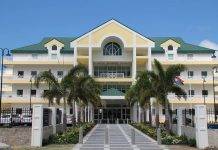At the end of every school year, students are evaluated and promoted or not promoted based on their performance during the year. Conversely, at the end of a parliamentary year, Members of Parliament are not evaluated yet they continue in parliament without anyone questioning their achievements, their performance or their competency to function as a parliamentarian.
I have observed that in several countries around the world, political and interest groups are developing report cards for parliamentarians. The idea behind the report card is to provide the public, especially the voters, with information about the performance of a parliamentarian so that at the next election, voters can make an informed decision about who is best suited to represent them in parliament, based on their performance during the past years.
I sincerely hope that MP Ardwell Iron’s proposal to report on how Members of Parliament voted during a parliamentary year will be included in the 2016-2017 Parliamentary Report. If included, it will give the public additional information as to how our MPs are functioning.
SMCP is developing a parliamentarian report card that will comprise the following benchmarks: attendance, participation, representation, supervision, legislation and interaction. These six benchmarks are derived from the job description of a parliamentarian that, according to our constitution, consists of three main functions: representation (art. 44), legislation (art. 82, 85, 86) and supervision (art. 62, 63, 64). Since the people (voters) placed their trust in a parliamentarian by electing him/her to office, it goes without saying that they should know how their parliamentarian is functioning. Therefore, let us look at these benchmarks and explain briefly what each one entails.
Attendance at meetings is the most obvious and objective benchmark. It includes the attendance at the plenary sessions of parliament and at the meetings of the central committee. All MPs are required to attend these two meetings. In addition, we will also include the attendance at the permanent and ad hoc committees, which is a requirement for the members of these committees but is voluntary for the other parliamentarians.
It seems as if parliamentarians do not realize that the greater part of their work occurs in the small or standing committees. These committees are therefore the backbone of parliament. In a press conference given the first week of January 2017, President of Parliament, MP Sarah Wescot-Williams, told the press “the work of Parliament is being slowed down due to the lack of activity by the parliamentary committees”. In other words, she is saying that these committees are not functioning.
Parliamentary Committees do the groundwork for the Central Committee. They research and investigate issues and laws then make recommendations to the Central Committee, which in turn will eventually, approve these recommendations and send them to the plenary session of parliament. In addition, most of the oversight work by parliament ought to be done in the standing committees. There is where the chair and members review the policies and the decisions of a minister or the government as well as investigate reports, complaints and problems related to a ministry or the government. Further, there is where questions directed to a minister or the government ought to be formulated and the answers reviewed for depth, thoroughness and accuracy.
Sadly, previous Annual Parliamentary Reports and observations during the current parliamentary year show that the standing committees hardly ever meet. During 2016-2017, twelve standing committees were installed but as far as we know, only two of these committees actually held meetings, namely the Ad Hoc Integrity Committee and the Petitions Committee. The remaining committees have remained dormant throughout the parliamentary year.
We would also like to point out a serious flaw in the selection of the chairpersons of the various standing committees. Members of the coalition chair all twelve standing committees. No wonder that the supervisory function of parliament is seriously compromised. One does not expect a coalition member in parliament to readily scrutinize and criticize the policies, decisions and performance of his/her coalition partner in the government. For example, with all the problems surrounding the Ministry of Justice, the Chairman of the Committee of Justice, MP Frans Richardson, never felt the need to call a meeting of this Committee. Further, with all the problems associated with the dump, the Chairman of the Committee of Public Housing, Spatial Planning, Environment and Infrastructure, MP drs. Rodolphe Samuel, never called a meeting. The same goes for all the other standing committees.
Under the topic of attendance I would like to mention here that it is unacceptable that mature, honorable Members of Parliament still have to be chided by the President of Parliament for being absent at meetings without due notice. With today’s plethora of technology – and mind you our MPs receive a smartphone at the beginning of their term of office – it is inexcusable that an MP still does not care to inform the President in a timely manner of his/her absence.
So, with regard to attendance, an MP’s report card will summarize his/her absence or presence, with or without notice at all meetings. But the attendance score related to the standing committees will weigh much heavier than the attendance at the other parliamentary meetings.
In the following article, we will elucidate the other five benchmarks of the MP Report Card!
Wycliffe Smith
Leader of the Sint Maarten Christian Party






























